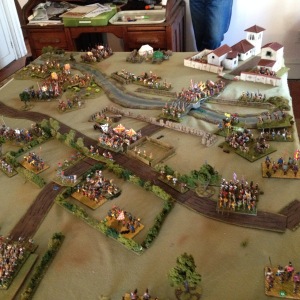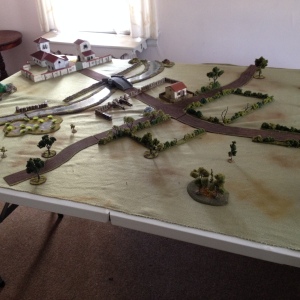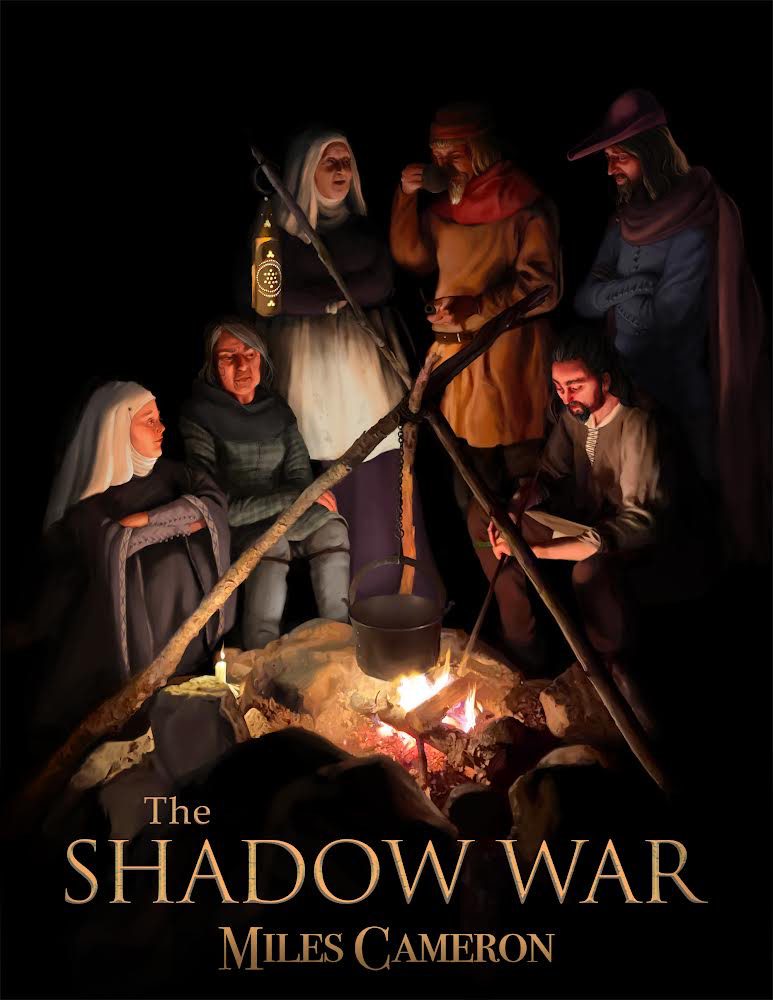
I spent last weekend in the United States, visiting friends from university and from my military career. And yes (nerdy spoiler) I’m an inveterate gamer as well as a sword nerd and a reading nerd and a history nerd. I play them all–fantasy role-plying games (RPGs hereafter) and historical RPGs and sci-fi games with 40,000 bits of plastic and resin and…
Never mind. Your eyes have no doubt glazed over. But I’m here to demonstrate that gaming can help your writing–and that writing is a lot like gaming.
I’ll also note that I have some slight familiarity with various massive online games, most especially Eve, in which a few of my local friends are fairly huge, and Rome Total War, for which I get screen shots and battle reports from several friends, and so on. I confess I don’t PLAY any of them. See, it’s like this. I’m self-employed. I write these books for a living… and if I got addicted–and sorry, friends, but that’s what it looks like to an outsider–to one of these awesome dream machines, I’d never write again, now would I?

So… on arriving in Philadelphia, I got to play AD+D (the current edition) with a mixed party of old, old friends (including two players from the original Alba Campaign that gave birth to the Red Knight) and some new, very able players from my friend Matt’s group. Matt Heppe is a self-published fantasy writer with a great blog and two solid novels. I read and enjoy his work, and I recommend ‘Eternal Knight’ to you, as well.
But, I confess, even better than reading a book is getting to be IN it. Isn’t this why we, the nerdy, started RPGs to begin with? We read Tolkien and E.R. Eddison and we said ‘I want to be In that world.’ The possibility of immersion in an adventure is the guiding principle behind–well, behind Space Opera, Historical fiction, Epic Fantasy, and all RPGs and most wargames, too.
So–I got to spend an evening INSIDE Matt’s Eternal Knight world. Brilliant. Fantastic. I’m told I acted just like Tom Swan. Secret? Tom Swan is really me. WIlliam Gold and Kineas and Arimnestos are all other people, but Tom Swan… anyway…

It was complicated, devious, included a general air of political betrayal, and in the end we rescued an absolutely ungrateful sorceress. What could be better than that?
And how does that effect writing?
Years ago, I had a chance to play–for more than a year–in another well-known author’s RPG. In this case, their was no particular system, and the DM was none other than Celia Friedman.
When the Gerald Tarrant books started to come out, I saw a few characters I recognized, including the priest played by my friend Joe, without a doubt the best role-player I have ever met. But the action was different and I wondered what had happened to all our good dice rolls and brilliant daring do. Well–it seemed brilliant at the time.
Years later, as the author of 20 or so books, I know. RPGs are useful tools for a writer–first and foremost, because the madcap/annoying players leap out of the funnel and go off and do their own thing instead of following a plot, you do learn to re-plot instantly. This may be the single best thing any author can learn–it sure saves time, and it does, after some practice, allow you to write characters who really have their own motivations–because players do. They do not obey. Even if they like the plot and they want to complete it, they will try to bend it to their own ends, the devils.
And that’s good, because in real life, there is no ‘plot.’ You can plot to kill Hitler, or plot the fall of an empire, but most people–even adventurous people in real life, like Giovanni Di Medici lead lives that virtually defy plot, wandering madly off in all directions in pursuit of three goals at once. Like–well, like people. Like trying to put a roof on your house, pay down your mortgage and get a vacation for your wife all at once. Eh? Normal life, but in some books, each character only tries to do one of those things and that action defines them.
Playing role playing games, and running them, can break you of this very quickly, because the experience of building adventures wherein seven people each have a vast host of wants and desires is incredibly educational. And they will push you to make sure that the antagonist (s) have the same level of complexity. We are not talking about busting dungeon doors and hacking stuff, here. We’re talking about state building with child soldiers (evil), large scale slavery (evil) trying to get money by theft and violence (well, in some adventures this is laudable. Francis Drake and Bilbo Baggins come to mind).
But the adventures themselves, as they come out, are almost un-readable–because the welter of confusion, mixed motivations and sheer luck does not make a great read. I’ve read a few. You have to pick and choose among the best moments of a long campaign–and whittle the motivations, the confusion, and luck–all down to a dull roar.
But… I learned a ton about writing from that game. I’m going to guess that Matt Heppe and Celia Friedman did too.
That was Saturday. On Sunday, I went across Philadelphia to Landsdowne, where I played in a gigantic Renaissance historical battle with thousands of small metal and plastic miniatures.

This game was run by Steve Callahan, one of my oldest friends, and he had put together a scenario that really owed a great deal to the role playing world–as most really good gaming scenarios do. We’d all painted just for this battle, so I arrived with a small force to represent the great 16th century condottierre Giovanni Dei Medici (see above) and my friend Bob Sulentic played Charles de Lannoy, generalissimo of the Holy Roman Emperor Charles V, while Steve Callahan, the scenario designer, played the reckless and chivalrous Francis I of France.

In the scenario (this is the battle report, skip it if you like and go to the end about writing) which we called ‘Not Pavia’ because it was like, but not just like, the great Battle of Pavia we (my Italian mercenaries) had to hold a newly created siege line or at least retreat carefully in the face of a massive surprise attack by the Spanish and Imperialists.


The game began with a master-stroke–Bob/De Lannoy rolled a 12 and both improved his commander and got his force flanking march onto the table immediately. I think that all three of us thought this stroke guaranteed Bob a decisive victory–Francis I hadn’t even appeared on the table, and there was no relief in sight for my handful of faithful mercenaries.

But–despite Bourbon’s early arrival, the Imperialist attack was slow. The Italian positions were protected by a river and three layers of hedges, and a small town, and each of these held the Imperialists for a little while. One of the French divisions started on table with the Italians–all skirmishers and mounted arquebusiers–and they held an enormous Spanish column at a ford while the Italians bore the brunt of the fighting in the hedges.
This felt very authentic. The Imperialists hopes of a smashing blow were frustrated, not defeated. They carried the trench lines under construction, but bogged in the hedges, where an Imperial general was killed by the Bande Nere’s harquebus fire and two units of Imperialist infantry destroyed.
Then King Francis arrived. Steve played him brilliantly, which was to say, he advanced at an incredibly impetuous rush the full length of a ten foot table in four turns and hurled himself on the first enemy unit he encountered. Do to poor dice and his own impetuosity, it took him two turns to cut his way through some Spanish musketeers. The Spanish pike men lowered their pikes and charged…
But it was Bourbon’s early advance on the left that was the instrument of its army’s own doom. Moving as rapidly as possible in the face of Dei Medici’s crack cavalry (and the only unit of Englishmen in the Italian Wars–Sir Richard Jarnigan’s demi-lances, and that’s a novel I hope to get to write) the Imperialist left began to lose units to attrition, heavy fire, and finally, perhaps the luckiest cavalry charge I’ve ever delivered.

The result was that Bourbon’s infantry, which had never faced a foe and advanced as fast as it could was suddenly stripped of all support, and found itself surrounded by a tired, but jubilant, set of Black Bands. The Italians fired again…
The Imperialist pikes charged a disordered and somewhat beaten up French King. Since his death or capture would be instant disaster for our army, I watched with what I hope was equanimity as Steve Callahan, who cannot usually roll dice to save his life, out-rolled Bob Sulentic. It was an amazing display of sheer luck–11 dice to six, and Steve managed a draw.
Francis stopped the Imperialist pikes cold–just as Dei Medici completed the encirclement of Bourbon.
Night fell in time to allow the Imperialists to withdraw without a disaster. But unlike in the real world, their attempt to break the siege had failed, and they’d incurred severe losses. Francis I was not captured, and Dei Medici lived (in the real battle, he’d been mortally wounded a few days before.) I found this interesting, as Francis I said after he was captured that if Dei Medici had been present, it would have been an whole other battle.
Oh–some details. Miniatures are by a whole variety of makers, but we all love Foundry, Perry, and TAG (The Assault Group). But there are miniatures on that table from our first games in 1982! Ral Partha and Hinchcliffe landsknechts…
This was our first outing with the Italian rules called Impetus, and I rate them at five stars. This is not a rules review, but I’ll suffice to say the mechanics are very elegant, the playability is remarkable, the mistakes we made were easily repaired the next time (all the shooting was too heavy because we missed a line) and best of all it felt authentic and interesting from command to appearance. I particularly like that every unit is a complete base. But I love to paint and build little scenes and this rules set seems to know that.
End Battle Report.
So… writing and wargaming?
Well–I’d love to give wargames like this an unqualified push, but that’s not what I really think. I really think it is a case of ‘garbage in, garbage out.’
A renaissance condottiere, when asked what three things made for the best army, replied, ‘first, money, second, money, and third, more money.’
Cicero, who knew a thing or two, said ‘the sinews of war are infinite money.’
The truth is that war-games tend to minimize the things that actually drive military success–like money, good logistics, a night’s sleep, clean drinking water and better foragers and recent pay–and replace them with arid concepts like ‘morale’ and ‘attack value’ that is often dependent on ‘weapons factors.’ All of which are often–wrong. Or opinions.
Perhaps most damnable of all for the author, the victory conditions are clearly stated and there are rules. Now, my experience of real war is pretty limited, but I was in the first Gulf War and in a regional ‘conflict’ in Central Africa as a sort of armed observer, and I’d like to note that in my experience the only rules are those you make and keep for yourself, and no one ever can tell you what the victory conditions are. In fact–with no offense to many professional soldiers I know–one of the worst things about having access to the command and control level ( I was a kind of intelligence officer and had pretty wide access) is the understanding–if you study military history–that the people running your forces have no real notion of what victory might look like. That, in fact, they are as blinkered today by their own expectations and the foolish demands of their political superiors as the generals of the past were limited by the horizon and the powder smoke. (Doubt me? Tell me how we plan to defeat ISIS. Don’t mention nukes.)
That’s another thing missing in games–the endless fog. Real war? You make decisions on no sleep, little food, and in a constant state of low-grade fear. Maybe a little diarrhea, just for fun. Wargame? You drink a beer and your greatest fear is the outright humiliation that your dice will turn and your pretend metal general will be ‘killed.’ And maybe you’ll have to pay for dinner. Everything is confused, and even in the modern world very few people can tell the decision makers exactly what is really happening. Wargame? You can see it all, laid out in nice paint and realistic scenery.
But…
But I learned a lot about war from these games. I merely insist that as writers, we have to know what we cannot know, if you’ll pardon the phrase. I learned how to read terrain. I can now find a defensible position in a single glance in fairly dense woods. I can read farm fields like a living geo-map, and so can almost anyone whose ever been a ‘combat infantryman’ probably better than me, but I learned a lot of that from deer hunting and more–much more–from playing games. Reading terrain–the coup d’oeil of the past–was, and is, an invaluable skill in war.
Wargames can also make you understand how to read a battle, if you understand that the process is less like ‘being there’ with Marilyn Monroe and more like dissecting her corpse. Wargame Gettysburg with ten friends on a weekend, and you’ll know that battle like the back of your hand–and, as an author, you’ll really get a feel for it as a narrative. That’s forensic (hey, hence my clever comment on the corpse, eh?) but it works. Often, it works as well or better than visiting the battlefield and walking over it. Since I can’t get to Jaxartes River or every other battlefield I write about (I do visit as many as I can–I know, it’s a terrible job but someone has to) I need this forensic method of approximating experience. And you see very well what it means to have the commander in the right place at the right time–you see how important that was. Of course, when your commander isn’t hovering over the battlefield, how the heck does he know what’s important? That’s in all my books, but that’s another topic…
But what made the game we just played magnificent–and what made the game Matt ran magnificent–was the work THEY put into it–the prep work. Hence the GIGO principle in action. We cannot assume all games–RPGs, Rome Total War or games in Steve’s parlour–are always so well prepared. Some, frankly, are war porn–nothing but pretty uniforms and a vague belief that one nation or another was ‘better.’ Crap, says I. That’s the lowest form of pseudo-fascism. If a wargame is going to teach you anything (like reenacting, actually) you have to work to make all the details authentic, to make the mechanisms transparent, and limit the false assumptions. You have to test ideas. Many wargames assume that the Roman Pilum was a sort of magic weapon, and had devastating effect. Care to test that? ‘Everyone’ knows that the British line was better than the French column. Right? Stupid French.
No. I won’t synopsize Brent Nosworthy’s Anatomy of Victory or all of C. Duffy, but I’ll say that all these statements are pretty banal, and often palpably false, and games based on them are equally false, and that makes building a simulation on lead soldiers and dice–well–difficult.
But Steve did it and so did Matt. it takes time, expertise, imagination…heck, it’s a lot like writing a good novel…
…wait, that was a circular argument….


Well Written, as expected. it is very easy to think that you know what things were like for the ‘real’ people, based on a re-enactment, whether it is with lead, or rattan, or steel. It takes mind work to understand even some of the limitations of those ‘media’.
What are some things that go into prep work for a game like this?
RPG, Chris, or the tabletop wargame?
The tabletop wargame was actually less work than one would think–Christian did a bunch of research and painting to put his ‘bande nere’ troops together, but Steve and I had been painting these guys for I dunno how long at this point. Decades, literally. Those figures have been through several sets of rules, the impetus rules just being the latest.